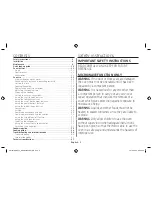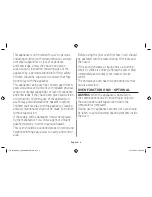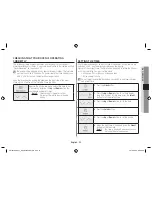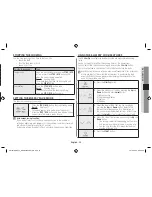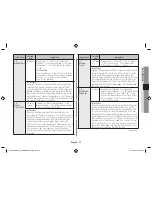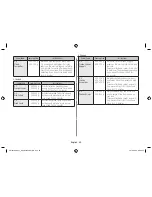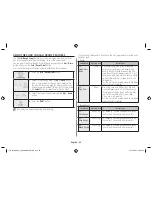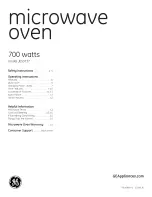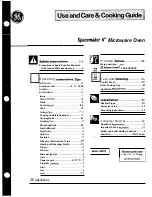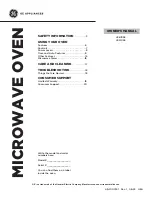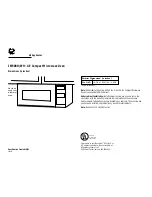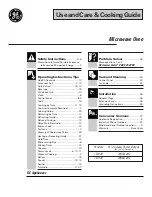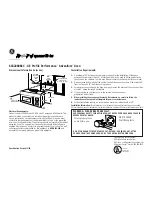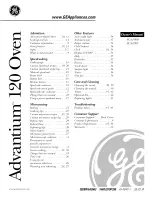
English - 7
English - 6
01
safet
y
ins
tr
uc
tions
microwave oven precautions
Only use microwave-safe utensils. Do not use metallic containers,
gold or silver trimmed dinnerware, skewers, etc.
Remove wire twist ties. Electric arcing may occur.
Do not use the oven to dry papers or clothes.
Use shorter times for small amounts of food to prevent
overheating or burning.
Keep the power cord and power plug away from water and heat
sources.
To avoid the risk of explosion, do not heat eggs with shells
or hard-boiled eggs. Do not heat airtight or vacuum-sealed
containers, nuts, tomatoes, etc.
Do not cover the ventilation slots with cloth or paper. This is a
fire hazard. The oven may overheat and turn off automatically
and will remain off until it cools sufficiently.
Always use oven mitts when removing a dish.
Stir liquids halfway during heating or after heating ends and
allow the liquid stand at least 20 seconds after heating to prevent
eruptive boiling.
Stand at arms length from the oven when opening the door to
avoid getting scalded by escaping hot air or steam.
Do not operate the oven when it is empty. The oven will
automatically shut down for 30 minutes for safety purposes. We
recommend placing a glass of water inside the oven at all times to
absorb microwave energy in case the oven is started accidentally.
Install the oven in compliance with the clearances in this manual.
(See Installing your microwave oven.)
Use caution when connecting other electrical appliances to
sockets near the oven.
Do not insert fingers or foreign substances. If foreign substances
enter the oven, unplug the power cord and contact a local
Samsung service centre.
Do not apply excessive pressure or impact to the oven.
Do not place the oven over fragile objects.
Ensure the power voltage, frequency, and current matches the
product specifications.
Firmly plug the power plug into the wall socket. Do not use
multiple plug adapters, extension cords, or electric transformers.
Do not hook the power cord on metal objects. Make sure the cord
is between objects or behind the oven.
Do not use a damaged power plug, power cord, or loose wall
socket. For damaged power plugs or cords, contact a local
Samsung service centre.
Do not pour or directly spray water onto the oven.
Do not place objects on the oven, inside, or on the oven door.
Do not spray volatile materials such as insecticide on the oven.
Do not store flammable materials in the oven. Because alcohol
vapours can contact hot parts of the oven, use caution when
heating food or drinks containing alcohol.
Children may bump themselves or catch their fingers on the door.
When opening/closing the door, keep children away.
microwave warning
Microwave heating of beverages may result in delayed eruptive
boiling; always use caution when handling the container. Always
allow beverages to stand at least 20 seconds before handling. If
necessary, stir during heating. Always stir after heating.
In the event of scalding, follow these First Aid instructions:
1.
Immerse the scalded area in cold water for at least 10 minutes.
2.
Cover with a clean, dry dressing.
3.
Do not apply any creams, oils, or lotions.
To avoid damaging the tray or rack, do not put the tray or rack in
water shortly after cooking.
Do not use the oven for deep fat frying because the oil
temperature cannot be controlled. This could result in a sudden
boil over of hot oils.
microwave operation precautions
Failure to observe the following safety precautions may result in
harmful exposure to microwave energy.
• Do not operate the oven with the door open. Do not tamper
with the safety interlocks (door latches). Do not insert
anything into the safety interlock holes.
• Do not place any object between the oven door and front
face or allow food or cleaner residue to accumulate on sealing
surfaces. Keep the door and door sealing surfaces clean by
wiping with a damp cloth and then with a soft, dry cloth after
each use.
• Do not operate the oven if it is damaged. Only operate after it
has been repaired by a qualified technician.
Important
: the oven door must close properly. The door must
not be bent; the door hinges must not be broken or loose; the
door seals and sealing surfaces must not be damaged.
• All adjustments or repairs must be done by a qualified
technician.
CE1041DSB2_TL_DE68-04429A-01_EN.indd 7
2016-02-22 �� 6:06:43


